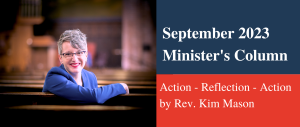
Action - Reflection - Action
During the 2021-22 church year, the board started talking about what it would mean for First Unitarian to be more engaged in social activism. Conversations included perspectives on the role of the church, the power of community and how we put faith into action. It also highlighted that the word “activist” has some specific connotations in the church. That conversation was the impetus for the Active Hope Project last year, where we spent a whole year listening to people’s thoughts on social action and what issue in our STL community that they are particularly passionate about. Through the Active Hope Project, we learned that the majority of people think the church has a role to play in advocating and working for change in our community and whether it was a clearinghouse or a coordinator, folks want the congregation to engage in social action. And it highlighted again that the words social action/social justice have one particular connotation: marching in the streets. With that knowledge, I thought it might be useful to share what I have come to understand as the Social Action, or Social Justice, Spectrum.
At any given point in time, there are issues of concern in the local, national and international community. Concerns can be about human rights or the environment or humanitarian needs. Frequently issues can fall into multiple intersecting categories. For example, issues of racial injustice are a human rights concern. Issues of climate change are an environmental concern. Environmental issues that impact specific populations of people and cause crisis situations cross all those areas. Hurricane Katrina would be one such example, where the worsening hurricane seasons led to a massive storm with subsequent flooding that disproportionately impacted people of color in New Orleans and created a humanitarian crisis.
The social justice spectrum is a model that says there are multiple ways to engage with an issue:
Service - meet the needs of people in distress
Education - learn about a social issue. Interpret the issue within the context of our UU values
Witness - make public by word or deed the convictions of an individual or organization regarding a particular issue
Advocacy - work through the legislative process to impact public policy
Community Organizing - participate in the process by which decisions are made in places of power. Collaborate with groups who know how to organize and influence power.
In the case of Hurricane Katrina you personally might have done one or more of these actions:
(a) learned about the racial history of New Orleans and why communities of color predominantly lived in the lower elevation areas of the city
(b) learned about the causes of climate change that are leading to stronger storm cycles
(c) sent financial aid to humanitarian organizations serving people displaced by the hurricane
(d) gone on a service trip to New Orleans to help with demolition and reconstruction
(e) signed a petition urging the US Army Corps of Engineers to change the levee system in New Orleans
(f) contacted your Senator or Representative about changing FEMA policies and procedures
All of these things (and more) were part of a social action lead response to Hurricane Katrina. For a lot of people, learning about the racial history of New Orleans was an important action. For others, giving to people surviving a disaster was a tangible action. And for others still, engaging in one of these actions led to participation in multiple other actions.
What I appreciate about the social action spectrum is that people can engage at any point along the spectrum and also move back and forth along the spectrum as new events occur, as new information is discovered, as new issues arise, and as new connections are uncovered. What the social action spectrum allows is a process of action/reflection/action, where learning leads to engagement which leads to action which leads to learning which leads to action… and you get the picture. In this model, we’re discussing a practice, one of action and reflection, that when rooted in our UU faith and values, becomes a spiritual practice.
Informed by the results of the Active Hope Project, we’re hosting a Community Outreach & Engagement Summit on October 1st. The Active Hope Project found that our congregation was inspired to engage on two issues: Racism and Housing/Homelessness. At the Summit, we’ll explore what would it mean to engage with a spiritual practice of social action - of acting and thinking and acting - of learning and serving and advocating, of witnessing and collaborating - on the topic of Housing and Homelessness. We’ll look at what we already do in this area, where we have connections and what aspects of this broad topic we want to work on. And we’ll ask the question, how will this process transform us?
I hope you can join us for this exciting gathering about how we engage with ourselves and our larger STL community.
In Faith
Kim

